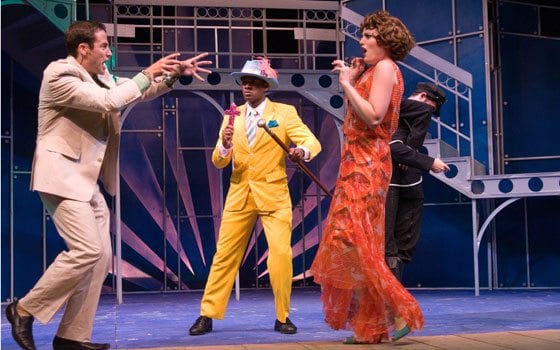
(From left): Antipholus of Syracuse (Dan Roach), Pinch (Cheo Hodari Bourne) and Adriana (Jennifer Ellis) share the stage in the Commonwealth Shakespeare Company’s production of “The Comedy of Errors,” running through Sunday, Aug. 16, 2009, at Boston Common. (Brilliantpictures Inc./Andrew Brilliant photo)
As night falls in Boston Common, a sunny, citrus-colored South Beach emerges on the stage near Parkman Bandstand, where the Commonwealth Shakespeare Company is performing its 14th annual free summer production in the park, “The Comedy of Errors.” Led by founding artistic director, Steven Maler, this exuberant and well-crafted production is the work of pros.
This effervescent staging of one of Shakespeare’s first comedies has sweetness, tartness and lots of color, from its Latin-inflected music and dance numbers to its elegant Art Deco costumes and stage set, all expertly illuminated by lighting designer Scott Pinkney with a warm glow that sets off their bright tones.
The sound design by David Wilson, who also created the production’s original music, beautifully projects the actors’ voices.
Maler has moved Shakespeare’s comedy from the Mediterranean trading capital of Ephesus to ’30s-era South Beach, a setting as crass, wild and cosmopolitan as any Elizabethan-era seaport.
Accommodating scenes with up to 27 players, the set design by Jon Savage includes a sand beach just below the stage, complete with a lifeguard on duty and a streamlined Art Deco structure on stage that evokes the town’s inns, bars and — improbably — an abbey, here more like a roadside mission. The actors move from aisle and beach to stage, and climb a spiral staircase where they are visible from the farthest beach blanket in the audience below.
In unison with the mime and dance scenes, the costumes by David Israel Reynoso do a lot of storytelling. They convey the kaleidoscope of character types populating this fantasy port, rife with high style — from the habits of the frolicking, line-dancing nuns, to the vaguely voodoo hat and suit of the exorcist Dr. Pinch, and the mid-calf chiffon dresses of the plot’s pampered matrons. Between acts, a svelte lady struts across the stage walking her greyhound, each time wearing an increasingly fantastical outfit.
In this flurry of flounce, sequins, chiffon and debonair eveningwear, the only plain-suited characters with a hint of sobriety are the merchants, including Egeon, played by Fred Sullivan Jr. A wealthy and worn Syracusan, Egeon faces execution because he has entered Ephesus, violating a law that reflects the bitter feud between the two trading capitals — Syracusans who enter Ephesus face death or a fine of 1,000 marks.
Duke Solinus of Ephesus, played as a suavely decadent figure by Dmetrius Conley-Williams, hears Egeon’s tale. The old man has traveled five summers in search of his son, Antipholus, who left Syracuse to find his mother and twin brother, who is also named Antipholus. The family was separated in a storm 33 years ago, when the boys were infants.
Also lost were another set of identical twins born on the same day, each named Dromio. Egeon purchased the twins from their impoverished parents and planned to raise them as his sons’ servants. Moved by his story, the Duke grants Egeon a day to find someone who will pay his ransom.
In the next scene, Antipholus of Syracuse (Dan Roach) and his manservant, Dromio of Syracuse (Larry Coen) arrive, and heeding a merchant’s warning, they do not reveal their hometown.
The audience soon finds out what these two will learn — that their twins are out and about in Ephesus.
Antipholus of Syracuse and his namesake in Ephesus, played by Josh Stamell, resemble each other, and each wears an identical linen suit. The two Dromios, pudgy clown-like figures, also wear the same costume, vintage caddie wear in loud plaid.
As the pair from Syracuse are mistaken for their Ephesian doubles, mishaps mount with giddying speed. Yet, although they look alike, the two Antipholus characters remain distinct.
Roach’s idealistic Syracusan is given to occasional soliloquies. Describing his search for his lost family, he says, “I to the world am like a drop of water / That in the ocean seeks another drop … / So I, to find a mother and a brother …” As he falls in love with Luciana, the sister-in-law of Antipholus of Ephesus, he reflects on her “gentle sovereign grace.”
The Syracusan is astonished — and occasionally frightened — by the perks that come his way as he is taken for his brother, a man of importance in Ephesus.
Accustomed to getting his way and paying for it, Antipholus of Ephesus is enraged to be shut out of his own house, where the Syracusans are dining in his place. He decides to visit his favorite courtesan and resolves to give her the gold chain he had commissioned for his wife. In the course of the day, he is arrested, exorcised by a witch doctor and confined to house arrest by Adriana (played by Jennifer Ellis), who becomes convinced that her husband has gone mad.
The two Syracusans dine with Adriana and her sister, Luciana (Zofia Gozynska, in a deliberately campy performance). The two women play their roles broadly. Ellis portrays a one-note, somewhat shrill Adriana. Gozynska, wearing a stiff wig of blond curls, uses a high-pitched voice to protest the advances of Antipholus, believing he is her brother-in-law.
The two Dromios also have distinct personalities. With the beautiful timbre of his voice and warm on-stage presence, Remo Airaldi moves his role as Dromio of Ephesus beyond the burlesque of a stock character. Coen’s Dromio shines as he mimes his speech describing Nell, the kitchen maid who has claimed him as her man, believing he is Dromio of Ephesus. As he steps across the stage, he says, “She is spherical, like a globe; I could find out / countries in her.” Egged on by his master’s questions, he proceeds to imagine a map of the world across her body.
In this society that runs on the trading of property, money and power, the true leading lady is the Courtesan, played with elegance by Rebecca Whitehurst. Dressed in a purple sequined cocktail dress and wearing her hair in a shiny black pageboy cut, her Courtesan is a modern girl with glamour, brains and independence.
At day’s end, as the Duke escorts Egeon to his execution, the two sets of twins encounter each other before the Abbess who has given the Syracusans shelter, played by Cheryl Singleton, as well as Adriana and Luciana. Egeon recognizes his sons and the Abbess reveals herself as Emilia, his long-lost wife.
Although it is a farce, stirrings of a new world are evident in the play, which was Shakespeare’s first to mention America — if only as a wart on Nell’s nose. Money talks in “The Comedy of Errors,” but so do family bonds. Moved by the reunion, Antipholus of Ephesus offers to buy his father’s freedom, but the Duke waives the ransom, his mercy breaking the pattern of violence.
Another hint of a new order comes in Shakespeare’s closing scene. All have left for a grand celebration except the two Dromios. Coen’s Dromio suggests that his brother, born a minute sooner, enter the party first. Airaldi’s Dromio responds, “We came into the world like brother and brother; And now let’s go hand in hand, not one before another.”
Whitehurst’s Courtesan returns to the stage for the production’s ebullient finale. All 27 cast members dance on stage, on the beach and in the aisles as, backed by a big band arrangement, she sings the Irving Berlin classic, “Let’s Face the Music and Dance.”
The Commonwealth Shakespeare Company’s production of “The Comedy of Errors” continues through Sunday, Aug. 16, 2009. For more information, visit http://www.commshakes.org.






